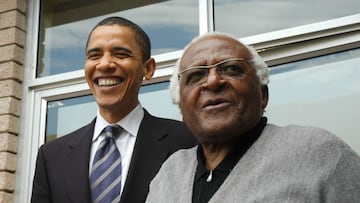What is Apartheid and what was the important role of Desmond Tutu in the fight?
The death of another of the anti-racist titans in South Africa is a great loss not just for the country, but the global fight against racism.


Archbishop Desmond Tutu, who was a key figure in the abolition of South Africa’s system of institutionalized racial segregation, known as apartheid, has died at the age of 90.
In a statement on Sunday, South African President Cyril Ramaphosa described Tutu as a “patriot without equal”, adding that his death is “another chapter of bereavement in our nation’s farewell to a generation of outstanding South Africans who have bequeathed us a liberated South Africa”.
The passing of Archbishop Emeritus Desmond Tutu is another chapter of bereavement in our nation’s farewell to a generation of outstanding South Africans who have bequeathed us a liberated South Africa. pic.twitter.com/vjzFb3QrNZ
— Cyril Ramaphosa 🇿🇦 (@CyrilRamaphosa) December 26, 2021
So what was the system of Apartheid, and how was it defeated?
White minority rule in a black nation
South Africa as we know it today was formed just 30 years ago. First set up as a British colony in the 19th century, the individual colonies united in 1910 to create the Union of South Africa. Black natives were denied basic rights, and all land and power was concentrated in the hands of white settlers and the colonial government.
Upon its formation it was a racist state; black people were forbidden to sit in parliament, live in certain towns, and were forbidden to occupy 'skilled' jobs. The white minority feared that any integration between the ethnic groups in South Africa would lead to the elimination of the white settlers British and Dutch ancestry and tradition, as well as their hold on all economic and social power in the state. This system became entrenched in national law in the 1940s with the election of the National Party, led by Daniel Francois Malan.
Individual races were characterized in law, preventing mixing of ethnic groups. Separate buildings in cities were constructed, or abandoned, for the races. Laws attacking Communism, it was the Cold War after all, were so open-ended that anyone whop disagreed with the government policy could be jailed. Essentially, dissenting voices were silenced at the flick of a pen.
International pressure and revolutionary struggle
Internal resistance against the state was quashed by the militarized society in white South Africa. Desmond Tutu, made General-Secretary of the South Arica Council of Churches in 1978, began to speak out against the treatment of blacks in the country. He sympathized with the armed struggle that was beginning to be waged against the white minority, while saying he could never do it himself. He was an ardent critic of the state, which had made non-violent protest pretty much impossible. Tutu had his access to travel continually restricted by the government, as he began touring many countries and explaining the situation in his country.
“If you are neutral in situations of injustice, you have chosen the side of the oppressor. If an elephant has its foot on the tail of a mouse, and you say that you are neutral, the mouse will not appreciate your neutrality”
— Double Down News (@DoubleDownNews) December 26, 2021
Rest in Power Desmond Tutu pic.twitter.com/50i7LCpDFR
At the same time, diplomatic pressure was growing on the South African government to lift apartheid. Sports teams were prevented from playing there, and South Africa was banned from the 1964 Tokyo games and the South African Olympic committee was prevented from joining future games. Economic sanctions were levied against the country. The United Nations banned the sale of weapons to South Africa, as well as oil sales.
Internationally, the famous figures were Tutu and agitator Nelson Mandela, who was first jailed in 1964. Mandela spent the next 27 years in prison for fighting the regime. A warden's first words when Nelson Mandela and his comrades arrived at Robben Island prison were, "This is the Island. This is where you will die."
Related stories
But he didn't die, and his legend inspired people around the world to fight injustice. Tutu himself won the Nobel Peace Prize in 1984 for his struggle, and both, and the whole of South Africa, were rewarded when the government buckled and repealed the apartheid laws in 1990. Black political parties were once again allowed, and in the first democratic elections in 1994 the African National Congress (ANC), won with Mandela the first president of the new Republic of South Africa.
Tutu fighting injustice after 1990
With the victory over apartheid in South Africa, Tutu turned his sight abroad against injustice. In his later years he was a fierce defender of the rights of Palestinians in the Occupied Territory. Upon visiting Israel, Tutu remarked, "What's being done to the Palestinians at checkpoints, for us, it's the kind of thing we experienced in South Africa." To his last days, he fought for the rights of oppressed peoples.
Many will celebrate his understanding of oppression & his status as South Africa's moral conscience but ignore his views on today's oppression & apartheid
— Miqdaad Versi (@miqdaad) December 26, 2021
ICYMI: he called on the US Presbyterian Church to boycott Israel & condemn it as an apartheid state
https://t.co/ALBpWBAI5e

